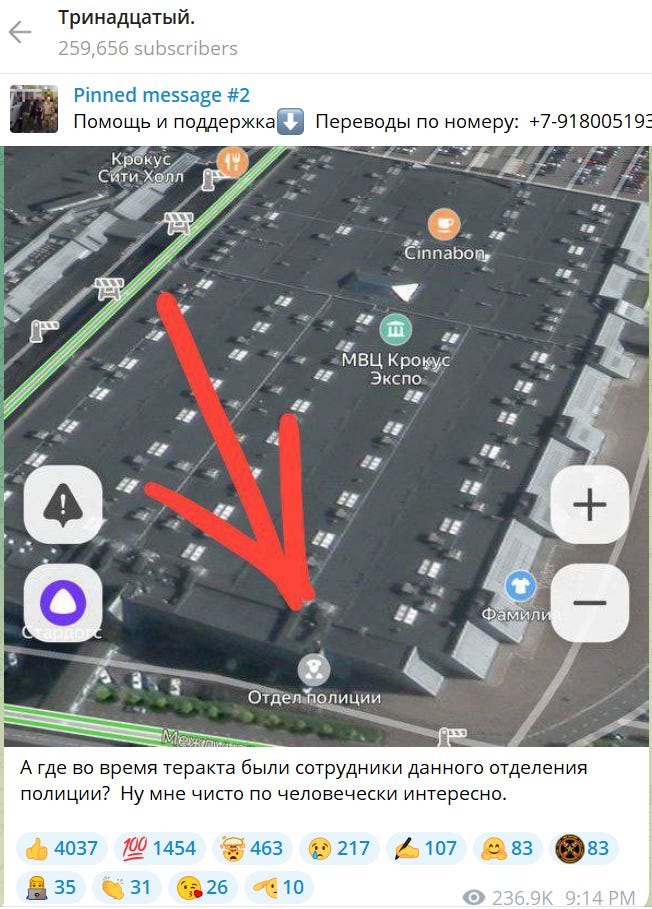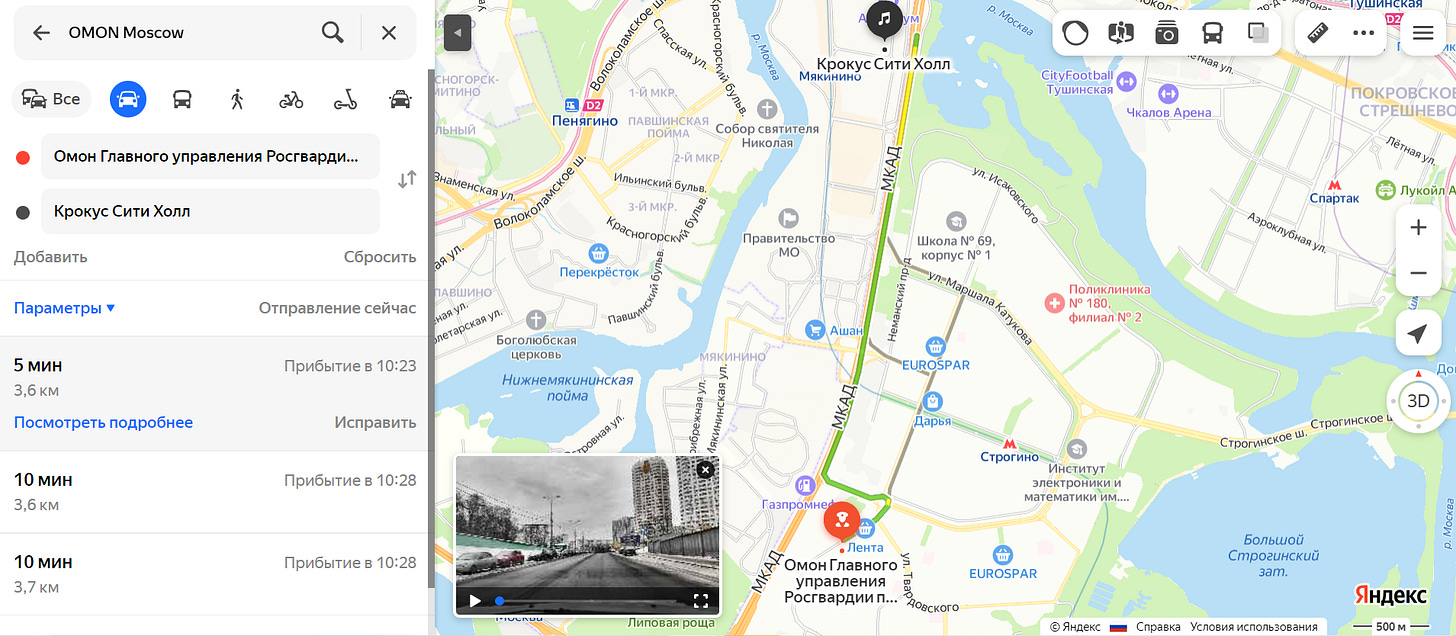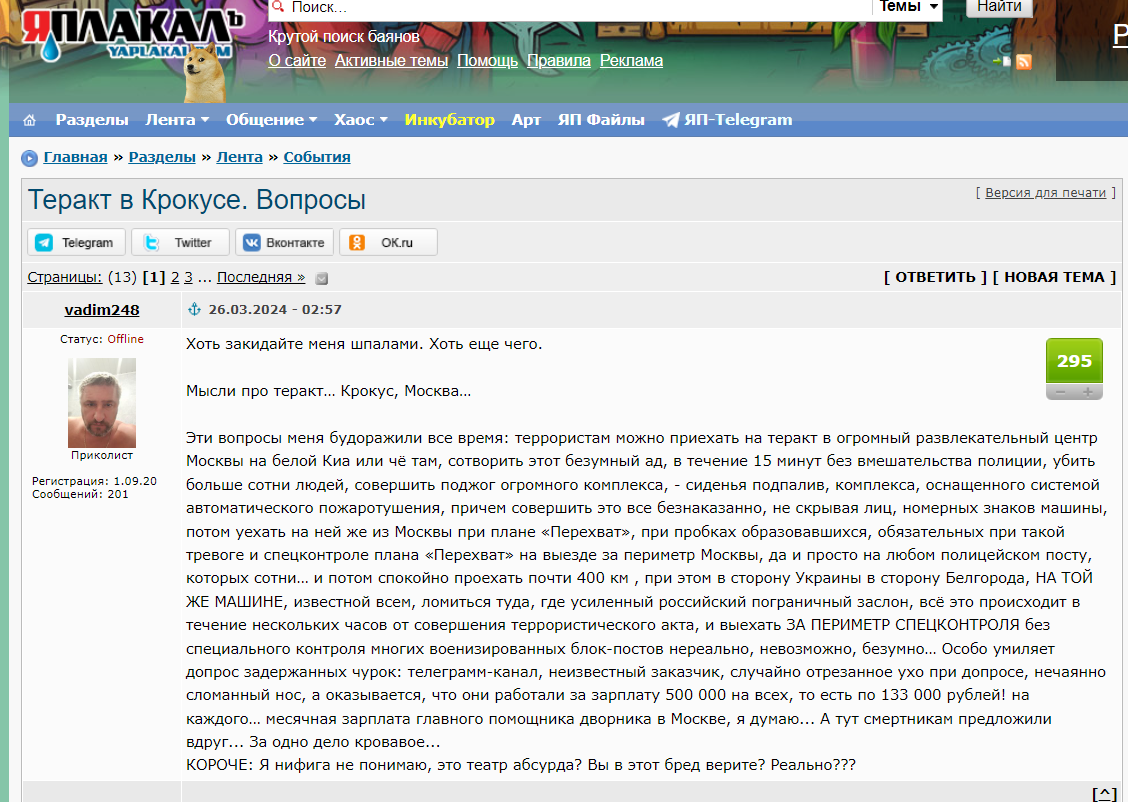Crocus terror attack: Question more?
Or is that a no-no?
On Tuesday I typed up a short blog post examining a video that purportedly shows the opening moments of the Crocus City Hall terrorist attack. I thought that the video was a little bit weird.
The post generated lots of colorful discussion. Some people agreed with my observations. Others thought I had misinterpreted the video’s contents. People have different views and that’s a-okay with me.
However, there was a handful of people who seemed to be genuinely offended by my blog post. A few people even called your devoted Russia correspondent nasty names—even anti-Russia. (I don’t know why; I never accused “Russia” of anything. Whenever something blows up or burns down, I just assume the Mossad is up to its usual trickery. But that’s just my personal opinion.)
Anyway, the rudeness and poo-flinging hurt my feelings very deeply—but then something occurred to me.
It occurred to me that probably some people who read my blog post were unaware that Russian social media—and even just normal Russian media—is exploding with Questions. Questions everywhere. Everywhere you look, a question.
There are even questions from very well-respected anti-vax/anti-cattle tag/anti-space lizard activists in Russia regarding the footage that I wrote about.
I would like to take this opportunity to share a few of the Questions being asked in Russia that for some reason are not being asked by the Incredulous Truth-Seeking Fearless Western & Completely Independent Alternative Media.
Questions about the behavior of law enforcement agencies
A question that has been asked repeatedly over the past six days on Russian social media—and even in regular Russian media—is: “So…where were the cops, bro?”

Parlamentskaya Gazeta, the official newspaper of Russia’s Federal Assembly, wrote on Tuesday that the “behavior of law enforcement agencies” was one of the “important questions that remain unanswered” in the wake of the attack:
As it became known later, the nearest police department was literally a stone’s throw from the concert hall—in the Crocus Expo 2 building. We are talking about the police department of the Pavshino microdistrict—anyone can easily verify its location by simply opening Yandex Maps.
According to Telegram channels, this is not just a booth with a local police officer, but a full-fledged stronghold, where, among other things, there is a weapons room. However, for some reason, not a single policeman was seen at the scene of the terrorist attack at first—law enforcement officers are absent from all the numerous videos and photos taken by both the victims and eyewitnesses of the tragedy.
Lawmakers have also pointed to the conspicuous lack of police presence.
“The work of the Ministry of Internal Affairs was not visible, at least to the extent that we would like … in the same building that was attacked there is a police station, but the criminals not only did their dirty deed—they also calmly went out and sat down in the same car they arrived in and fled. This, of course, is nonsense,” Biysultan Khamzaev, a member of the State Duma Committee on Security and Anti-Corruption, commented.
State Duma deputy Alexander Khinshtein revealed on Monday that Crocus Profi, the private security company contracted to guard Crocus City Hall, did not launch an emergency response to the terrorist attack, even though it had access to “military service” weapons.
“The arsenal is stored in the building next door to Crocus, but the guards were on duty without [firearms]. The emergency response team of [Crocus Profi] is also based there, which, however, also did not go to the site after the terrorist attack,” Khinshtein said.

One survivor of the attack told Moskovsky Komsomolets that “there was literally no security at all” at Crocus. This was in sharp contrast to a concert they attended at the same venue six months earlier: “In that case, everything around the concert hall was cordoned off by the police, there were buses with riot police, several ambulances...But here—no one.”
Although the timeline of events differs slightly depending on the source, the shooting reportedly started a few minutes before 20:00 on March 22.
TASS reported that OMON units were en route to Crocus City Hall at 20:33. They reached the concert hall at 21:05, according to a TASS correspondent at the scene.

The Moscow headquarters for the National Guard’s OMON (riot/SWAT) police is located 3.6 km (2.2 miles) from Crocus City Hall:

The Ministry of Internal Affairs claims police arrived at the scene five minutes after receiving information about the shooting. Members of the National Guard reached the scene 15 minutes after “the first report” of the attack, according to Khinshtein.
That’s the official story.
But as Russian parliament’s official newspaper astutely observed, questions remain about the “behavior of law enforcement agencies” during this tragic and horrific event. Some of these questions are even being asked on popular Russian normie forums like Yaplakal:

Calling the police, as it turned out, helps quite a bit, because they can arrive in a minute or an hour. A matter of luck. Maybe there were traffic jams there in Moscow. […]
In general, questions are multiplying, but there are no answers. The main question here is this: if this whole theater of security doesn’t protect us at all, then why is it needed at all? Why do we need these metal detectors-checks-questions-x-rays and police patrols on every corner? …
I would like to say a lot more words. “Incompetence” isn’t the most appropriate, but it’s the first thing that comes to mind.
In general, it is clear what will happen now. Tightening, tightening the screws …
So many questions. Here are some more questions:
Questions about the fire
The terrorist attack killed 139 people, 40 of whom died from gunshot wounds, Alexander Bastrykin, head of the Investigative Committee of the Russian Federation, said on March 25.
The terrorists were extremely time efficient and incredibly resourceful. In as little as fifteen minutes, they were able to ignite a massive blaze by lobbing Molotovs and setting chairs on fire. Here’s an excerpt from Komsomolskaya Pravda’s timeline of the attack:
20.01. People are trying to go down from the mezzanine, but shooting begins in the hall. At the same time, terrorists are throwing Molotov cocktails, setting fire to chairs. People are trying to escape: some lie down on the floor, some head upstairs, some run behind the stage. […]
20.15. A strong fire breaks out and the premises are gradually covered in thick smoke. Some people run out into the street. Some remain in the building, barricaded in toilets and utility rooms, not knowing that the terrorists have escaped... […]
21.10. The roof and part of the upper floors are engulfed in fire. Dozens of fire brigades are trying to fight the flames.
To summarize: the upper floors and roof of this large building were “engulfed in fire” about an hour after an unspecified number of Molotovs were thrown and several chairs were set on fire.
That’s the official story.
Nikolai Starikov, a popular political commentator who makes regular appearances on Russian state television, has some questions about this:
There are still many questions about the terrorist attack, and especially the fire at Crocus City Hall.
“I would like to remember another tragedy that occurred on March 25, 2018. I mean the fire in the Winter Cherry shopping center. The area of the fire was 1600 meters. In Crocus City Hall, according to the Ministry of Emergency Situations, 13,000 meters were burning.
It will be very interesting to get an answer to the question of how one or two thrown incendiary mixtures could have turned into a fire 8-10 times larger than the fire that destroyed the shopping center in 2018.
I think that the answer to this question is the key to a complete solution and answer to all the questions that society asks itself as a result of this terrorist attack. Why did the fire spread so quickly? Were there other arsonists?
How this huge building could catch fire, so that so many people died in the fire and smoke, the answer to this question is extremely important,” he said about this in his weekly live broadcast.

The Ministry of Emergency Situations claims that the building’s fire alarm and other safety features were fully functional during the attack.

Yuri Podolyak, a popular Russian blogger with 2.8 million subscribers on Telegram, thinks that the Ministry of Emergency Situations is bending the truth a little bit:
Once again I want to return to the topic of the tragedy in Crocus. Unfortunately, this tragedy revealed not only the massive heroism of our people, but also many of the ills of our society.
Moment one. I would like to start again with the report to the President of the Minister of Emergency Situations Alexander Kurenkov (https://t.me/yurasumy/14015), where he said that allegedly the fire extinguishing system in the building “worked normally.”
Once again I went through everything I could find from the videos. AND I DID NOT FIND ANY CONFIRMATION OF THIS FACT. On the contrary, social media is replete with terrible footage of people who suffocated or burned alive; it is clearly visible that [the claim that the sprinkler system worked] IS A LIE.
Apparently, one of his subordinates clearly deceived the minister on this issue, and he, in turn, misled the president and the entire country. And there is a lot of testimony that many fire exits WERE CLOSED and this also led to casualties.
I am sure that if Mr. Minister PERSONALLY reviews these personnel, and does not trust his subordinates, he will be HORRIFIED by how he was set up in front of the president and the country by his own subordinates.
And I have a suspicion that there was a corruption component in this issue.
Podolyak also has some pointed questions for the owner of Crocus City Hall, an Azeri oligarch (sorry, “entrepreneur”) by the name of Araz Agalarov. If you’re craving info about Araz, Rolo has some interesting details. Or just use your favorite search engine.
For our purposes, it’s enough to say that Araz Agalarov is a rich guy who owes (owed?) Sberbank a huge amount of money and is now expecting an insurance payout.

Podolyak included this information in his Telegram post, noting that it’s strange that a building that burned down so easily could even be insured in the first place. Russians seem to think his observations are relevant, because his post currently has 1.8 million views.

Agalarov started taking interviews almost immediately after the attack happened. He claims the sprinkler system worked so well that they actually had to turn it off at 4 am, because by then the building was a burnt crisp. Stop and reread that sentence. This is what Agalarov claims, though:

The friendly oligarch also vowed that he would rebuild the venue—which some people thought was a bit insensitive, considering that emergency workers were still searching for bodies under the rubble:

We’ll return to this weirdo later. Let’s wrap things up.
Questions about asking questions
When are we supposed to Question More, and when are we not supposed to ask questions? It would be very helpful if the Question Police could publish information explaining the rules, because many, many Russians are asking questions—and that might be Illegal?
For example, Moscow City Duma deputy Ekaterina Engalycheva has some questions:
We are all shocked by the tragedy in Crocus. Analyzing what happened, I think it is necessary to think about how it was possible to minimize the casualties and, most importantly, what needs to be done to prevent this from happening again?
And here a lot of questions arise:
Why in a building where public events are regularly held:
▪︎ the evacuation of people and children was not organized?
▪︎ why were the emergency exits closed, the men breaking down the doors and finding blocked passages?
▪︎ why didn’t the lights go out, all sorts of flashlights continued to entertain both inside and outside while the Crocus was burning, and the safe emergency lighting didn’t turn on instead?
▪︎ why didn’t the fire extinguishing system, which is supposed to prevent a tragedy, work? After all, it wasn’t a paper mill that was burning, but an essentially empty building, where, in theory, there was nothing to burn.
▪︎ why did everything inside and the building itself burn so quickly, like a candle, should such things be finished and built only from non-combustible materials?
▪︎ why aren’t events attended by thousands of people guarded? […]
▪︎ why did the special forces enter Crocus only an hour later, when the terrorists had already left, especially considering that the distance from the Main Directorate of the Russian Guard in Moscow to the Crocus shopping center is only 4 minutes by car?
And another question:
how many people died at the hands of terrorists, and how many people suffocated or suffered burns due to the notorious corrupt failure to ensure fire safety and careless, economical construction?
Before the owner of the building, a billionaire, approves subsidies from the state for the restoration of Crocus, it would be worth asking him these questions.
And at the same time, to all the officials who cover up for non-compliance with fire safety standards too!
Here is another Yaplakal post, titled “Terrorist attack at Crocus. Questions”, that was up-voted to the forum’s front page:

Thoughts about the terrorist attack... Crocus, Moscow...
These questions are nagging me all the time: terrorists can come to a terrorist attack in a huge entertainment center in Moscow in a white Kia or whatever, create this crazy hell within 15 minutes without police intervention, kill more than a hundred people, commit arson of a huge complex—setting the seats on fire, in a complex equipped with an automatic fire extinguishing system—and do it all with impunity, without hiding their faces… […]IN SHORT: I don’t understand anything, is this a theater of the absurd? Do you believe this nonsense? Really???




Definitely keep up with the Questioning More™, Edward.
But normies or not, the Yaplakal post you quote is right:
“The main question here is this: if this whole theater of security doesn’t protect us at all, then why is it needed at all? Why do we need these metal detectors-checks-questions-x-rays and police patrols on every corner? …
“In general, it is clear what will happen now. Tightening, tightening the screws …”
What happened and who did it matter, but regardless of those answers, the response to the failure of costly, dehumanizing, spirit-strangling security measures will certainly be (once again) to impose more of them.
Curious that a terrorist attack in Moscow allegedly committed by the Ukraine (or ISIS, whatever) with more than 130 victims receives even less twitter attention than the death of Navalny or the Kate Middleton thing whatever it was. As if the respected alt media or influencers or whatever sense that better not talk about this.